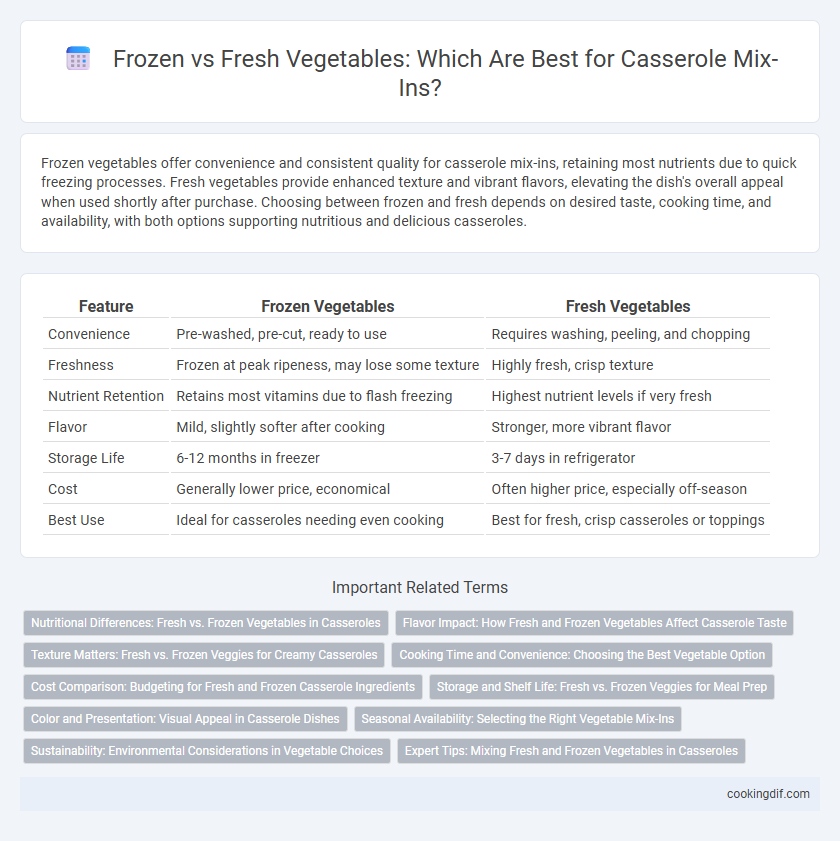Frozen vegetables offer convenience and consistent quality for casserole mix-ins, retaining most nutrients due to quick freezing processes. Fresh vegetables provide enhanced texture and vibrant flavors, elevating the dish's overall appeal when used shortly after purchase. Choosing between frozen and fresh depends on desired taste, cooking time, and availability, with both options supporting nutritious and delicious casseroles.
Table of Comparison
| Feature | Frozen Vegetables | Fresh Vegetables |
|---|---|---|
| Convenience | Pre-washed, pre-cut, ready to use | Requires washing, peeling, and chopping |
| Freshness | Frozen at peak ripeness, may lose some texture | Highly fresh, crisp texture |
| Nutrient Retention | Retains most vitamins due to flash freezing | Highest nutrient levels if very fresh |
| Flavor | Mild, slightly softer after cooking | Stronger, more vibrant flavor |
| Storage Life | 6-12 months in freezer | 3-7 days in refrigerator |
| Cost | Generally lower price, economical | Often higher price, especially off-season |
| Best Use | Ideal for casseroles needing even cooking | Best for fresh, crisp casseroles or toppings |
Nutritional Differences: Fresh vs. Frozen Vegetables in Casseroles
Frozen vegetables retain most of their nutrients due to rapid freezing shortly after harvest, preserving vitamins like vitamin C and minerals essential for casserole mix-ins. Fresh vegetables may offer slightly higher levels of certain phytonutrients but can lose nutrients during transport and storage before cooking. Choosing between fresh and frozen vegetables for casseroles depends on nutrient preservation priority, convenience, and ingredient availability without compromising overall nutritional value.
Flavor Impact: How Fresh and Frozen Vegetables Affect Casserole Taste
Frozen vegetables retain much of their nutritional value but often have a slightly muted flavor compared to fresh vegetables, which can result in a less vibrant casserole taste. Fresh vegetables provide a crisper texture and more pronounced, natural flavors that enhance the overall depth and appeal of the dish. Choosing fresh mix-ins typically elevates the casserole's flavor profile, while frozen options offer convenience with minor trade-offs in taste intensity.
Texture Matters: Fresh vs. Frozen Veggies for Creamy Casseroles
Fresh vegetables typically provide a crisper texture and more vibrant flavor, enhancing the overall mouthfeel of creamy casseroles. Frozen vegetables, while convenient and often nutritionally comparable, tend to release more water during cooking, which can result in a softer, sometimes mushier texture. Choosing fresh veggies for casserole mix-ins helps maintain the desired creamy consistency without excess moisture diluting the dish.
Cooking Time and Convenience: Choosing the Best Vegetable Option
Frozen vegetables offer a significant advantage in cooking time and convenience for casserole mix-ins, as they are pre-cut and partially cooked, reducing overall bake time. Fresh vegetables require more preparation, such as washing, chopping, and sometimes blanching, which can extend the cooking process. Opting for frozen vegetables ensures consistent texture and flavor while simplifying meal prep and speeding up the casserole assembly.
Cost Comparison: Budgeting for Fresh and Frozen Casserole Ingredients
Frozen vegetables typically offer a more cost-effective option for casserole mix-ins, with prices often 30-50% lower than fresh produce, making them ideal for budget-conscious cooking. Fresh vegetables, while sometimes pricier, provide superior texture and flavor but can increase the overall cost of casseroles, especially when using seasonal or organic varieties. Choosing frozen vegetables can reduce food waste and extend shelf life, providing economical convenience without significantly compromising nutritional value.
Storage and Shelf Life: Fresh vs. Frozen Veggies for Meal Prep
Frozen vegetables offer significantly longer shelf life than fresh veggies, lasting up to 8-12 months in the freezer without nutrient loss, making them ideal for long-term storage and meal prep convenience. Fresh vegetables require refrigeration and typically spoil within 3-7 days, necessitating quicker usage for casseroles to maintain optimal flavor and texture. Choosing frozen vegetables reduces food waste and ensures consistent availability of mix-ins throughout the year, especially for casseroles prepared in bulk.
Color and Presentation: Visual Appeal in Casserole Dishes
Frozen vegetables retain vibrant colors due to flash-freezing, enhancing the visual appeal of casserole dishes by preserving their natural hues. Fresh vegetables often offer a brighter and more varied color palette, contributing to a more visually dynamic presentation in casseroles. Choosing between frozen and fresh vegetables depends on the desired texture and color intensity, with both options capable of elevating the overall appearance of the dish.
Seasonal Availability: Selecting the Right Vegetable Mix-Ins
Frozen vegetables offer consistent quality and availability year-round, making them ideal for casserole mix-ins when fresh options are out of season. Seasonal availability significantly impacts the flavor and texture of fresh vegetables, often resulting in more vibrant and nutrient-rich additions during peak harvest times. Balancing frozen and fresh vegetables based on seasonality ensures optimal taste and preserves the nutritional benefits in casseroles.
Sustainability: Environmental Considerations in Vegetable Choices
Frozen vegetables for casserole mix-ins often have a lower environmental footprint due to reduced food waste and longer shelf life, minimizing the need for frequent harvesting and transportation. Fresh vegetables, while potentially offering higher nutrient retention, require more energy for refrigeration and have a higher risk of spoilage, leading to increased waste. Choosing frozen options supports sustainable consumption by optimizing resource use and reducing greenhouse gas emissions linked to the supply chain.
Expert Tips: Mixing Fresh and Frozen Vegetables in Casseroles
Expert tips recommend combining fresh and frozen vegetables in casseroles to balance texture and flavor while ensuring nutritional value. Fresh vegetables add vibrant color and crispness, while frozen vegetables contribute convenience and consistent quality during off-season. Properly thawing and draining frozen vegetables prevents excess moisture, maintaining the casserole's ideal consistency.
Frozen vegetables vs fresh vegetables for casserole mix-ins Infographic

 cookingdif.com
cookingdif.com